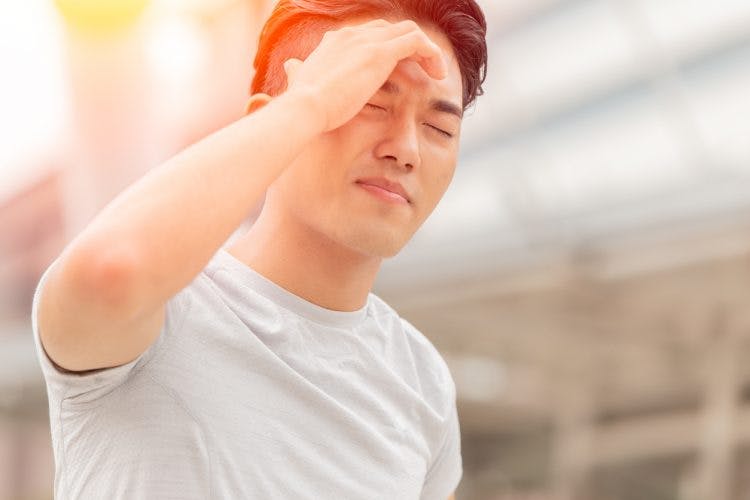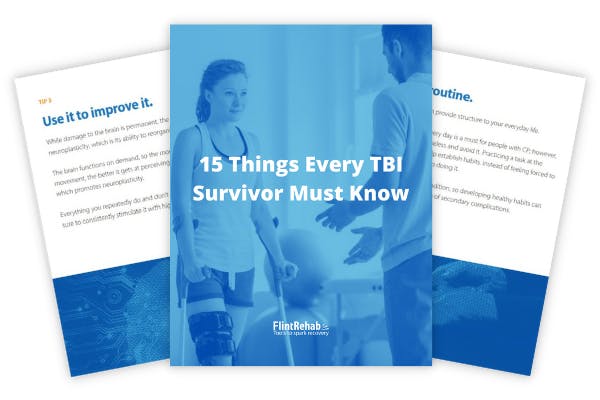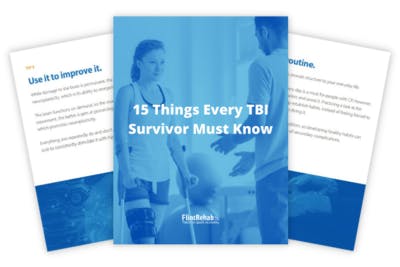No products in the cart.
No products in the cart.
No products in the cart.
No products in the cart.
Home » Neurological Recovery Blog » Traumatic Brain Injury » Light Sensitivity After Head Injury: 5 Effective Ways to Overcome Photophobia
Last updated on March 23, 2021

Light sensitivity is a common problem after a head injury. However, sometimes the symptoms of light sensitivity can be hard to recognize, as they often overlap with other symptoms of brain injury.
Today’s article will help you identify the causes and symptoms of light sensitivity and show you some of the best ways to cope with it.
Light sensitivity, or photophobia, is one of the most common symptoms of mild traumatic brain injury and concussion. It mainly occurs after damage to the thalamus.
The thalamus filters visual information and sends that data to different brain regions. After a head injury, blood vessels that deliver oxygen to the thalamus can become damaged and therefore starve the thalamus of nutrients.
If this happens, the thalamus can no longer filter your vision, causing a visual overload. This explains why dark rooms, which have less visual information, are often more tolerable for head injury patients than bright rooms.
However, damage to the thalamus is not the only cause of light sensitivity. Other body systems and areas of the brain that also play a role include the:
After a head injury, a person will usually have a combination of these problems. Fortunately, it is possible to treat most of these causes.

The most common symptoms of light sensitivity include:
There are also other symptoms that may accompany light sensitivity, such as:
While these symptoms are not necessarily caused by the photosensitivity directly, they may go hand in hand because of being very common after a head injury. Additionally, because your brain may be using extra energy to try to process bright light after a brain injury, this may limit the energy it has left for other activities. This could contribute to dizziness and fatigue.
If you had a mild TBI or even a concussion, your light sensitivity will likely resolve on its own after a few weeks. However, with more severe TBI or a condition called post-concussion syndrome (where you demonstrate symptoms of a concussion beyond the normal recovery period), photosensitivity will probably not go away without treatment. Be sure to work closely with your doctor.
The following treatments may help to minimize light sensitivity after a head injury:

If your photophobia is associated with dizziness, the vestibular system may be at the root of the problem. Therefore, healing your vestibular system may decrease your photophobia.
You can accomplish this through vestibular therapy exercises. These exercises will target your balance, motion-induced dizziness, and visual issues.
Some sample exercises you can try include:
Some of these exercises may cause you to feel slightly dizzy, so be sure to have someone spot you if you feel unbalanced. If the dizziness grows too intense, sit down immediately and rest.
Once again, if a head injury affects your vision, it can make you more sensitive to light. Strengthening your eye muscles through vision therapy may help reduce strain on your eyes.
Gaze stabilization exercises can help you with this. Therapists use these exercises to help patients focus on a stationary object while moving.
Some gaze stabilization exercises include:
Try to perform at least 10-15 repetitions of these exercises. Keep increasing the amount of time you spend on them without bringing on too severe of symptoms.

Flavonoids are a group of antioxidants that come from plants. While research is scarce, they are thought to be important for your vision and overall eye health. Additionally flavonoids are known to stimulate production of BDNF (brain-derived neurotrophic factor), which can significantly aid the brain’s healing process.
As your brain heals, it can handle more sensory information at one time. This may reduce your sensitivity to light.
Most brightly colored foods contain flavonoids, including:
The more antioxidants you consume, the more you will reduce the inflammation in your brain. Over time, this will alleviate your photophobia symptoms.
New research shows that aerobic exercise can drastically reduce TBI symptoms and post-concussion syndrome symptoms, including light sensitivity. Some other benefits of exercise include:
Although exercise is helpful, don’t overdo it. If it causes your symptoms to worsen, then continue resting and try some other treatments instead.

While the above treatments should reduce your sensitivity to light, they will not cure you instantly. Until then, you must protect your eyes.
The following are a few effective ways to accomplish this:
Finally, try to get enough sleep. The more sleep you get, the faster your brain will heal. This means you should stop using screens at least an hour before bed.
Light sensitivity after a head injury can be frustrating and painful. Most cases will fade on their own, but some may require a little extra help.
By understanding the sources of light sensitivity, you can better equip yourself to treat it.
We hope this article helps you move forward on your recovery from the symptoms of head injury.

If you like our content, you’ll love our ebook and newsletters! Get instant access to our TBI recovery tips ebook with 20 pages of helpful advice by signing up below.
You’ll also receive our emails that share survivor stories and more useful TBI recovery tips, which you can opt out of at any time. (We know you’ll love them, too.)
We will never sell your email address, and we never spam. That we promise.


Time with a speech therapist is extremely valuable during recovery, especially if you struggle with communication, critical thinking, or memory after brain injury. Insurance typically covers speech therapy for a fixed amount of time. But once it’s over, recovery is in your hands.
That’s why a team of neuroscientists and clinicians from Boston University created the CT Speech & Cognitive Therapy app. Designed for those recovering from stroke, TBI, or living with neurological conditions, the app contains over 100,000 cognitive exercises that are all available right from your phone or tablet. That’s like having a speech therapist by your side whenever you want!
This app is the perfect fit if you want to improve your speaking, memory, or general mental sharpness. And, it’s affordable at just $29.99/month!
“For the past 6 months, my son has used the app about three times a week. The app is like a virtual therapist, it’s very easy to use, and it gives him immediate feedback.
He now understands things faster, can make decisions with less hesitation, has improved recognition of words, and his confidence is higher. I also find it easy to get in touch with customer service; they pleasantly help out. The whole experience has been great.”
— Miriam
With the CT App, you can get the guidance you need right from your phone or tablet. You can use it on your own or in between sessions with your speech therapist.
Whether you struggle with aphasia, memory loss, or critical thinking, the CT Speech & Cognitive Therapy App can help.
“The CT app has helped me gather my confidence by building on and reinforcing old forgotten skills. It helps to see my percentages increase, and work harder when they decrease. It’s very self-motivating.” -Kathryn
We are confident that this app will help improve your speech and cognitive function after brain injury. Like our recovery tools, the CT App is also covered by our 30-day money-back guarantee.

Do you know these 15 TBI recovery tips?
Get a free copy of our ebook 15 Things Every TBI Survivor Must Know. Click here to get instant access.
Grab a free rehab exercise ebook!
Sign up to receive a free PDF ebook with recovery exercises for stroke, traumatic brain injury, or spinal cord injury below: